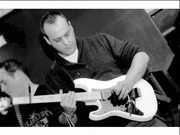Tutor HuntResources Music Theory Resources
Is It Really Essential To Learn Music Theory?
This article will explain why it is essential to learn at least basic music theory when learning your specific instrument
Date : 05/10/2013
Author Information

Uploaded by : Peter
Uploaded on : 05/10/2013
Subject : Music Theory
1. Music theory is only about memorizing and learning notes, key signatures, chords, etc. 2. I don't need music theory, because if I learn too much, I won't be able to express myself freely with music. 3. Theory is too much over analyzing, which isn't to make great music. Just sit down and write how you feel! 4. Music theory is too hard. In order to understand it, I need to be incredibly intelligent, attend a university, etc.. 5. Learning theory will take away from my playing time, and overall experience as a musician.
So what is music theory really?
Very simply, music theory is the study of how to express yourself with music. It is a set of guidelines and rules that are made to help us understand the different ways to express emotions with sound. Learning music theory is essential for musicians, and certainly any truly great musicians or artists.
Have you ever listened to a beautiful song and wondered: "How can I write music like that?" The answer is music theory. Music theory is not just learning how to build chords, learn intervals, learn key signatures, etc. Every single concept in music theory is an idea or foundation for learning how to express your thoughts with sound and music.
Some people say that music theory is not necessary because if you analyze too much, then you are not feeling the music on an emotional level.. Or, that not all musicians truly have to know music theory to make good music. Well, here is the truth: The more you know about music theory, the more you can accurately express your specific ideas, thoughts, and emotions with music.
Imagine if you wanted to start exercising to build your muscles and become stronger. You wouldn't say this to yourself: "I am passionate about having big muscles and exercise! But, I don't need to know anything about nutrition, general health, weight lifting routines, etc. That will only stop me from getting stronger. All I need to do is go to the gym to lift weights when I am in the right mood, and I will get the results I want."
Do you see how this doesn't make sense? After a while, all musicians, songwriters, or potential songwriters run into a mental block where they are lacking information they need in order to bring their ideas to life through music. By learning music theory, you can learn how the various sounds and rhythms of music are used to create emotion in the listener. By learning the processes and patterns that are used in music theory, you can avoid musical "writer's block."
Not only will music theory help you when you are writing music, it will help you get better when you are improvising and you have to think quickly about what notes to play next. Learning why certain notes make you feel a certain way will help you to make quicker decisions in any musical situation. One of the problems that people have is that they think that music theory is too hard. Anything you are learning for the first time might seem more difficult, but as you keep learning a practicing, it becomes more easier.
Learning music theory also depends on your own personal goals. What do you want to focus on with music?: Learn how to write songs, be a great and expressive composer, play songs for fun, master techniques, play in a band, teach guitar, teach music, etc? Music theory will help you in any of these situations. However, if you plan on becoming a great musician or musical artist, then a great knowledge of music theory must be a huge priority for you!
There is one thing that is very important that many people do not realise when they are wondering whether or not they should learn music theory.Music theory is fun! Remember, you have a passion for music. It is only natural to feel excited and stimulated by learning new things. Also, learning is and always will be "work" to some degree. However, it always takes hard work and effort to be great at something, and whether you enjoy that work or dislike that work is what will determine how far you get with it. Don't just do the given exercises that you read, and be done. Do any exercises, and then make your own exercises..do them until they are second nature! Enjoy the learning process, and do every single exercise while keeping your music goals in mind to help you stay motivated..
Here is a small list of things that music theory will help you with:
Understanding why your favourite musician used a certain chord in his or her song. Writing your own songs. Making nice sounding chord progressions. Becoming a better at guitar or any instrument you play. Understanding why music makes you feel a certain emotion. Writing songs that are catchy, happy, sad, and everything in between. Filling in the different sections of a song. Helping you get past writer's block; when you are stuck and you can't think of what to do next. Understanding what notes to use when you play a melody over a chord progression. And much more!
So keeping all of these things in mind, what is stopping you from learning music theory right now? If you need to improve your music theory and composition knowledge, enquire within my page for tuition and we can begin working together to help you express yourself better and become a more complete musician.
This resource was uploaded by: Peter
